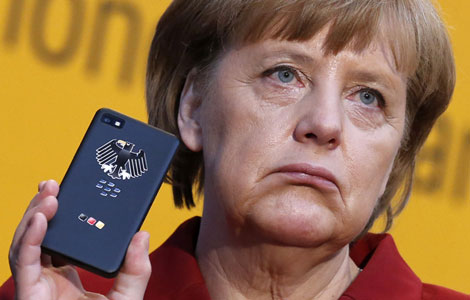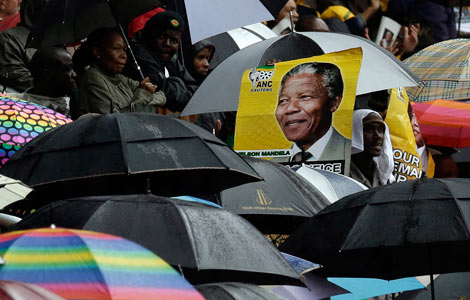Urban shoppers shifting to online purchases
Updated: 2013-12-12 00:31
By He Wei (China Daily)
|
||||||||
With China poised to overtake the US this year as the world's largest e-commerce market, urban residents are shopping online and buying more, reports He Wei in Shanghai.
 |
|
Local residents in Beijing look through an e-shop selling yachts on Taobao, a major online shopping site in China, on Dec 11, 2013.[Zou Hong/China Daily] |
Online purchases have become the first choice among shoppers in first-tier cities, according to a survey of taxi passengers.
China Daily conducted a poll of 134,026 people by teaming up with Touchmedia, the national leader in media presentations in taxis, from Dec 1 to 9. Fifty-two percent of the taxis involved in the survey were in Shanghai, with others in Beijing, Guangzhou and Shenzhen.
More than two-fifths of the Chinese nationals who responded to the survey cited e-commerce sites as their top choice for shopping. These included online marketplaces such as Tmall and Taobao, business-to-customer sites such as JDMall and official brand websites.
Foreign residents in China are less inclined to embrace online shopping. About one-third of the expatriates living in Shanghai said they prefer brick-and-mortar stores.
Among 24,218 foreigners surveyed who live overseas but were visiting the city, the top three shopping choices were convenience stores, shopping malls and department stores.
All respondents were allowed to list up to three choices, with the results given equal importance and bundled together.
About 40 percent of the Chinese respondents said they pay for online purchases by using bank cards online or through third-party payment platforms, including Alipay.
The figure was 10 percentage points lower among foreign respondents, with 21 percent citing cash as the primary payment option, followed by in-person credit card use.
China is poised to overtake the United States to become the world's largest e-commerce market this year, according to estimates from consultancy Bain & Co.
With 32 percent average annual growth forecast, online shopping expenditure in China is set to reach 3.3 trillion yuan ($539 billion) by 2015, the consultancy said in a report.
The poll was conducted two weeks after Alibaba Group Holding Ltd achieved record single-day sales of 35 billion yuan on Nov 11.
On Thursday, 2.11 million small vendors and mom-and-pop shops that operate on Alibaba's Taobao Marketplace will offer discounts to woo customers and boost sales.
Taobao merchants must ensure that the prices are the lowest they've offered in the past 30 days.
More than 60 million products will be 50 percent off, according to Taobao data, while an additional 1.2 billion yuan in discounts will be distributed in the form of digital coupons.
Ahead of the event, Taobao has been promoting offbeat online auctions, according to the company's public relations team in Hong Kong, such as 684 gold bars, bricks and ornaments.
from page 13
Also up for sale: 16 thoroughbred racehorses imported from the United States and Saudi Arabia.
More than 30 local Chinese courts are taking advantage of the shopping event, pledging to auction seized goods on Taobao. Since last June, 98 local courts have agreed to display confiscated goods online, with 1,175 items being auctioned via the website.
On Thursday, participating courts will offer items ranging from smartphones to luxury cars, as well as 120 real estate properties, according to the company. The costliest item is an industrial plant with a starting bid of 51 million yuan.
Taobao will employ sales analysis to help smaller merchants attract buyers by handing out discount vouchers geared to individuals' shopping history, said Zhang Yu, president of Taobao.
Downloading a Taobao marketing tool enables vendors to identify popular items and provide discounts to entice consumers.
The software has been installed by more than 1 million Taobao sellers since October, the company said. It is also distributing 100 million yuan cash incentives to encourage the use of its mobile app.
Taobao will highlight products tailored to customers' needs. For example, elderly customers can buy products ranging from heated underwear to nail clippers equipped with magnifying glasses.
The move is in line with Alibaba's aim to have 1 million Taobao shops with annual sales topping 100 million yuan.
Because websites successfully feed store sales, building a dedicated digital team and investing in a world-class website are critical to grabbing a foothold in e-commerce territory, said Serge Hoffmann, partner in Bain & Co's retail practice in China.
Chinese companies are increasingly embracing the use of "big data" as an effective marketing tool, said Xie Enwei, chief cloud officer at Microsoft Corp's China operations.
"The likes of Alibaba and Tencent (Holding Ltd) are cutting-edge Chinese Internet firms that widely apply ‘big data' technology, which will set the tone for industry trends," Xie said.
These moves will help closely monitor and analyze data to allow insightful and timely solutions, he said.
Microsoft, as a cloud solutions provider, has witnessed a surge in such cloud-based demand, notably from millions of Chinese small and medium-sized enterprises, Xie added.
Amazon China also sees technology as its key advantage in China's booming but increasingly competitive e-commerce market. "Compared with sales promotions and advertisements, technology is what makes us stand out in the market in the long run," said Brian Hui, vice-president of Amazon China.
The company has selected about 500,000 products out of the 20 million it keeps in stock to participate in the 12-12 shopping event.
But the majority of the products involved in the sales event weren't chosen by people but recommended automatically by computers, said Hui.
He said that based on the large database covering Amazon China's shoppers and the company's edge in data mining, the computers can predict what Chinese consumers want to buy. "We then enroll these computer-selected items into online shopping festivals in China. They cannot help but be a hit."
In the Nov 11 shopping event, Amazon China saw its sales soar 300 percent compared with the 24-hour sales event last year.
Meng Jing in Beijing contributed to this story.
Contact the writer at hewei@chinadaily.com.cn
Most Viewed
Editor's Picks

|

|

|

|

|

|
Today's Top News
'Containing China' a Japanese strategy
Pilots must qualify to land in haze
Talent plan to unleash creativity
China watches for Japan's security, defense plans
Holiday dates for 2014 unveiled
Handshake could signal improving ties
US Congress negotiators reach budget deal
Retirees saddled with kids' costs
US Weekly

|

|















